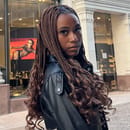Ever since I could remember I’ve always been fascinated with pop culture and celebrity gossip. I grew up hooked on the glitz and glamor of getting a peek into the lives of the elite — whether it was begging my parents to buy me the latest edition of Tiger Beat (I feel so old saying that) or seeing my mom look at another Access Hollywood episode. As I progressed through my awkward teen years, I began to embrace fan culture more and more, which resulted in my first parasocial interactions.
Participating in fan culture can be a rewarding experience. You can communicate with other fans, create friendships based on a shared interest, even start new hobbies or projects in support of an artist, show, character, or movie. The risk of becoming too involved, however, is developing a fixation rather than admiration — especially with celebrities, the boundaries of creating and growing a parasocial relationship may become toxic for your well-being.
In recent weeks, the conversation regarding Doja Cat’s behavior towards her fans has brought to light my own parasocial relationships with celebrities I admire. If you’re not familiar with the drama, let me quickly catch you up: Doja Cat faced backlash online for some of the rude remarks she used on Threads regarding her fans calling themselves Kittenz (an unofficial fan club name), claiming that her supporters don’t call themselves anything. She then clashed with several fan pages, and when one user asked her to state that she loved them, she replied, “I don’t though cuz I don’t even know yall.”
Doja Cat’s reply sums up what a parasocial relationship is; it’s defined by the National Register of Health Service Psychologists as a “one-sided relationship, where one person extends emotional energy, interest and time, and the other party, the persona, is completely unaware of the other’s existence.” Doja Cat’s attitude towards her fans, specifically her comment about not knowing her fans at all, shifted the controversy to a discussion about the healthy relationships normal people may have with a celebrity they like. Some people agreed with Doja’s sentiment that she was simply creating a boundary against toxic fans, while others criticized her because her fanbase unconditionally supports her activities and elevates her status.
For me, I fall somewhere in the middle. As a self-proclaimed fangirl who has been captivated by the newest celebrity gossip, pop culture event, and trends since I was a kid, it’s difficult not to become lost in fan cultures and, as a result, in an interest in the associated fandom and celebrity. I had no idea how unhealthy delving into parasocial connections could be until I found myself spending an excessive amount of time supporting the artist when I knew they didn’t even know I existed.
My parasocial interaction was highly influenced by boy bands. When I was a junior in high school, one of my friends was a big fan of the boy band PrettyMuch. The group had barely been around for a year when I found out about them. Since I’ve been a fan of boy bands since the Jonas Brothers and 5 Seconds of Summer, you can imagine how quickly I became immersed in the fan base and group as a whole.
When my friend and I hung out, PrettyMuch was all we spoke about. In a group chat, we shared all of our current knowledge on the band and their music releases. I remember having a sleepover where we listened to their music on a loop for hours, watched their new content videos, and chatted about the members and who we liked best (I’m a Brandon girl).
We even decided to create a joint Instagram fanpage to follow other BEANZ (the fandom moniker) and share updates on their latest releases, as well as videos of the members we thought were cute. I remember sneaking my AirPods in during class while my teacher lectured to listen to their song “Jello,” solely to help them get their streams higher. I’d tell my friends about the group all the time (most of the time without them asking), and I’d check my Instagram feeds every couple of hours to see if their group account had posted or if one of the members had done a livestream. When a friend asked if I wanted to attend their concert later that summer, I paid whatever it took to obtain a floor seat as close to them as possible.
During the height of my obsession, accusations and rumors about PrettyMuch began to circulate. The group was embroiled in controversy in 2020 after previous tweets from some of the members surfaced, in which they used racial slurs such as the N-word and anti-Asian rhetoric, as well as using words like “gay” as an insult. When I learned about the scandal, I was devastated since these actions contradicted my values and also attacked my identity as a Black girl. While some fans trended hashtags for PrettyMuch to apologize, I felt like other fans just ignored some of these comments and went on to defend them. It wasn’t until I stepped away that I realized I had been doing the same thing as the fans I denounced.

When someone criticized them, I felt irritated or disrespected because they didn’t agree with me. I realized that a fan’s passion for their artist may cross problematic lines if it meant defending the artist at all costs, especially when some issues need to be handled by the artist directly.
I lost interest in PrettyMuch as I questioned my fixation for them. I felt like I was wasting too much of my time on a relationship that didn’t truly help me, other than to provide me with momentary happiness. That, combined with my tremendous feelings of anxiety as I began my first year of college during the COVID-19 pandemic, made me feel like I needed to take a break to discover myself rather than attempting to find myself in others.
I’m still a fangirl of many different boy bands, and I’m excited to share my passion with others since it’s been a defining aspect throughout my youth. But I now know the importance of setting boundaries and have accepted that you don’t have to know every waking detail about your favorite artist to be called a devoted fan. I believe I was also fortunate enough to have my fangirl life intersect with my career passions — being able to write about my favorite pop culture trend and entertainment release on Her Campus for people to read and also spark interest in — which helped me to demonstrate that you can always find a way to have a healthy love for the artist while still loving yourself.



